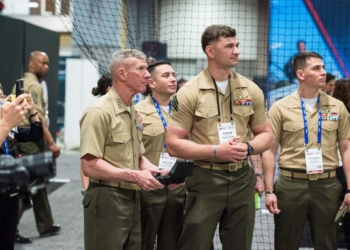Justin Constantine knows all about being challenged. In 2006, he survived an almost fatal gunshot to the head by a sniper in Iraq. It didn’t stop him. Instead, this now retired, Purple Heart recipient and decorated Marine fought through endless surgeries and therapy to become a successful entrepreneur and renowned motivational speaker.
President George W. Bush painted Constantine for his book, “Portraits of Courage,” and Constantine has received multiple awards for his work with veterans and advocacy efforts for those with disabilities. Constantine even gave a TEDx talk on being strong, which has transformed countless lives. Just as COVID-19 started igniting fear and anxiety throughout the world, he received a phone call from a doctor that would challenge his own strength: Stage 4 cancer.
Constantine was told it was very severe and had spread from his prostate to his bones. Rather than let the currently incurable diagnosis stop him, Constantine is using it to motivate him to become an even better version of himself.
Constantine overhauled his diet completely, cutting out anything that could be harmful or “feed” his cancer. He exercises every day and implemented daily meditation into his routine. He shared that he’s lost 35 pounds since his diagnosis and is the healthiest he’s ever been.
“I focus on why today was a good day and why tomorrow will be great too. I look at how I can infuse positivity in my life. It doesn’t mean unicorns and rainbows all the time, it means I make my glass half full,” Constantine shared.
Receiving his diagnosis during a world pandemic has been difficult, but Constantine has decided to continue to utilize his own past and current challenges to help motivate and encourage others.
“I’m not saying it’s easy because you have to look at what your challenge is and choose to push past it. It takes effort,” he explained.
Constantine emboldens people to examine their lives and determine how they can have more purpose and happiness.
“COVID is going to cast a long shadow over our lives. Things are a lot more complicated than they were a few months ago but with that comes time to think about what’s really important,” he shared.
Reports of increased suicide among veterans during COVID-19 has been present in the media, something that weighs heavily on Constantine. Despite dealing with his own significant medical challenges, he still remains focused on supporting veterans and encouraging them to seek support.
“That’s so sad that someone has something that they are going through right now and it means life isn’t worth living. If they could step up and look down, they may see how many people care about them and want them to be here,” he said.
Constantine referenced his own experience of healing from his gunshot wound and then developing post-traumatic stress disorder. He sought counseling without hesitation for his PTSD, despite working for the FBI. He was very open about receiving services and it didn’t impede his continuing career.
“I saw my counselor for 18 months for an hour each week. You could tell the difference in me if I missed a session. I encourage veterans to get the help they need and deserve for themselves and for their families,” he said.
Constantine often credits his wife, Dahlia, with being his rock. He shared that he knows how lucky he is to have her as his constant support and partner through life, especially since many people may not have that kind of presence in their own lives. To that he encourages all people and especially veterans who may be struggling to know they aren’t alone.
“Together we are stronger; help is just a phone call away. There is always someone waiting to support you,” he said.
Throughout the past five months of the pandemic, Constantine has been consistently recording public motivational videos on his social media. He’s also been reaching out to veterans he identifies that may need support and doing his best to be an encouraging voice for them.
All while facing his own deeply personal challenge.
The effort Constantine exhibits may be born from his own experiences of recovering from his gunshot wound. When asked if he thinks surviving his near-fatal wound made him more prepared to receive his current diagnosis, Constantine said yes. He explained that the experience definitely contributed to his commitment to overcoming cancer.
“I think it was poignant. I feel that knowing that I overcame such a significant challenge before, makes me very confident that this too shall pass and I will push past this too,” he said.
Although Constantine may be facing the fight of his life, he continues to make the active choice not to fall into despair or spend his days thinking about his diagnosis. Instead, he’s doing what he’s always done: motivating others and living with purpose.










































